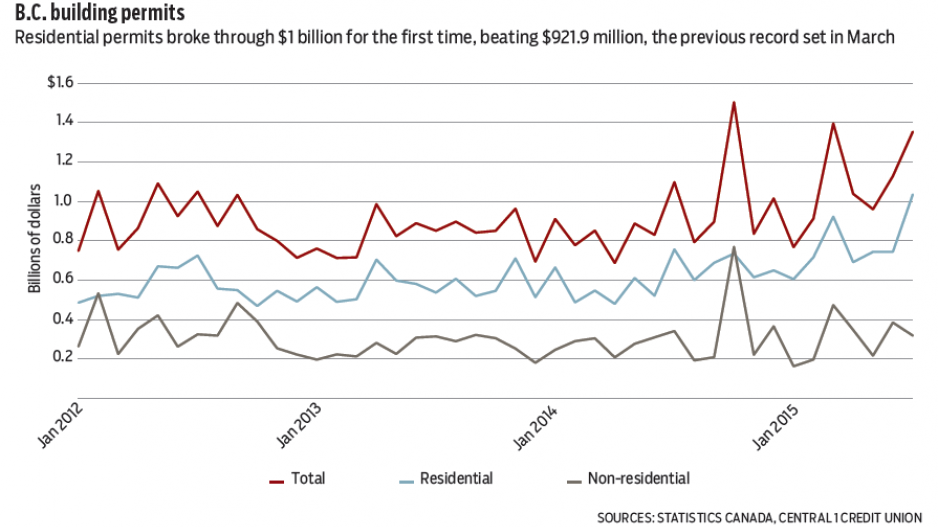Residential building permits in British Columbia surged to a new record in July and pushed total permits to their second-highest level at $1.35 billion. Residential permits broke through $1 billion for the first time at $1.03 billion, beating the previous record set in March of this year at $921.9 million.
Total building permits in B.C. rose 19.9% in July over June due to a 31.9% increase in Metro Vancouver and a 26.7% rise in Victoria. Year-to-date permits were up 23.6% to $7.56 billion in B.C. over the same period last year. In contrast, the comparable figure for Canada was down 1.2%. Residential permits provided the main boost with a 32.2% gain this year in B.C. while non-residential permits were up 5.8%.
Among B.C.’s four census metropolitan areas (CMAs), Kelowna led with a 44.8% year-to-date gain over last year followed by Metro Vancouver at 33.2% and Victoria CMA at 22.5%, while the Abbotsford CMA posted a 1.9% decline.
However, residential permits were up in all CMAs, led by Victoria’s 56.4% increase.
Non-residential permitting activity is more subdued than residential, reflecting those market conditions and investment factors. Within the non-residential sector, industrial and commercial permits were higher than last year by 24% and 7.8% respectively, while publicly initiated permits were down 6.6%. Private non-residential permits typically rise more robustly after the economy has grown at an above-trend pace for some time. Public permits are driven more by fiscal policy and less by economic conditions.
Building permits will continue on their record-setting pace into next year and beyond as long as the B.C. economy does not fall into recession. Economic recessions in B.C. are almost always sparked by external events, and while there are a number of potential catalysts, no recession is expected for the U.S. or the global economy in 2016 or 2017.
August housing starts drop
Following two consecutive above-trend months, August housing starts fell in B.C.’s urban areas to a seasonally adjusted annual rate of 26,300 units. In July, housing starts hit their highest rate since the recession at 36,500 units. Construction of multiple units accounts for the monthly swing, mainly due to a decline in apartment units. Single-detached starts are more stable on a monthly basis.
Housing starts so far this year were up 12% over last year with equal gains for single and multiples units. Metro Vancouver saw only a 5% rise thus far. Starts in the Victoria CMA were up 83%, with Abbotsford CMA rising 18% and Kelowna up 10%. The remaining urban areas in B.C. recorded a 22% increase.
Helmut Pastrick is chief economist with Central 1 Credit Union.




